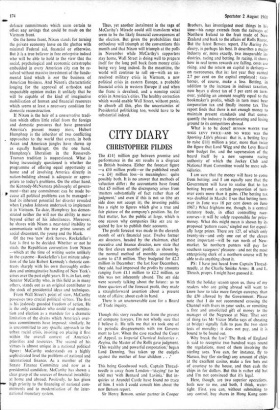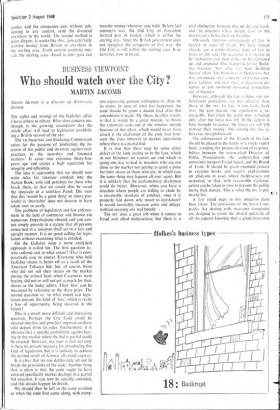CITY DIARY
CHRISTOPHER FILDES
The £141 million gap between promise and performance in the aEt results is a disgrace to British business. Either the forecast figure —a £10 million profit—or the published result —a £41 million loss—is meaningless: quite possibly both. It is no answer that methods of valuation differ: the accountants have found that £5 million of the discrepancy arises from `matters substantially of fact rather than of judgment,' and even if this is not so (the am side does not accept it), the investing public has a right to figures which give a true and fair picture of the company's position. So, for that matter, has the public at large, which is one reason why companies like AEI are re- quired by law to publish their accounts.
The profit forecast was made in the eleventh month of AEI'S financial year. Twelve former AEI directors, headed by the chairman, chief executive and finance director, now state that the first eleven months' profits, as shown by the normal method of monthly accounting, came to £7.8 million. They budgeted for £2.2 million in December: the last four Decembers, they add, had improved the profits by amounts ranging from £1.1 million to '£2.2 million, so this was not inherently absurd. The AEI side were scarcely talking about the future: as to three quarters of the forecast profit, they made a straightforward assertion about a present state of affairs; about cash in hand.
There is an unanswerable case for a Board of Trade inquiry.
Though this story reaches me from the gravest of company lawyers, I'm not wholly sure that I believe it. He tells me that Kr took one of its periodic disagreements with HM Govern- ment to law. When the case reached the Court of Appeal, as Imperial Chemical Industries v. Regina, the Master of the Rolls gave judgment. `This wealthy and powerful corporation,' began Lord Denning, 'has taken up the cudgels against the mother of four children . .
This being Goodwood week, Captain Thread- needle is away from London—'staying' (so he told me) 'with Bernard and Lavinia.' But in- quiries at Arundel Castle have found no trace of him. I wish I could consult him about the new Benson report.
Sir Henry Benson, senior partner in Cooper
Brothers, has investigated most things in his time—his range extends from the railways of Northern Ireland to the fruit trade of New Zealand and back to the affairs of Rolls Razor. But the latest Benson, report, The Racing In- dustry, is perhaps his best. It describes a major industry or, more exactly, two inseparable in- dustries, racing and betting. In racing, it shows how in real terms rewards are falling, costs are rising, and the return on capital is derisory— on racecourses, that is: last year they earned 2.7 per cent on the capital employed: race- horses, of course, make a loss. Betting, in addition to the increase in indirect taxation, now bears a- direct tax of 5 per cent on turn- over, yielding an amount roughly equal to the bookmaker's profits, which in turn must bear corporation tax and finally income tax. The report finds that there is not enough money to maintain present standards and that conse- quently the industry is deteriorating and losing ground to its competitors abroad.
What is to be done? BENSON WANTS THE WIGG LEVY TWICE-AND NO WIGG was the Sporting Life's phrase: that is, a betting levy to raise £111 million a year, more than twice the figure that Lord Wigg and the Levy Board now budget for, and the supersession of the board itself by a new supreme racing authority of which the Jockey Club and National Hunt Committee would be mere sub- sidiaries.
I am sure that the money will have to come from betting; and I am equally sure that the Government will have to realise that to tax betting beyond a certain proportion of turn- over costs more than it gains. (The betting tax was doubled in March: I see that betting turn- over in June was 18 per cent down on June 1967.) What frightens me, though, is a- central statutory body, in effect controlling race- courses—it will be solely responsible for prize- money. What this might mean is shown by its proposed 'pattern races,' singled out for especi- ally large prizes. There are 127, of which only twenty-six—and only one out of the eleven most important—will be run north of New- market. So northern punters will pay for southern racegoers' pleasure—and not the most enterprising clerk of a northern course will be able to do anything about it.
PS: I have just heard from Captain Thread- needle. at the Charlie Smirke Arms: B. and L. Thrush, proprs. I might have guessed it.
With the holiday season upon us, those of my readers who are going abroad will want to know how to take more foreign currency than the £50 allowed by the Government. Please note that I do not recommend crossing the Channel with fivers in your socks, or remitting a free and unsolicited gift of money to the manager of the Negresco at Nice. That sort of thing (as Mr Victor Mollo says of cheating at bridge) signally fails to pass the two stern tests of morality : it does not pay, and it is bound to be found out.
Why break the law? The Bank of England is said to recognise two hundred ways round the regulations, most of them involving the sterling area. You can, for instance, fly to Nassau, buy (for sterling) any amount of chips at the excellent casino, make a few bets out of courtesy to the house, and then cash the chips in for dollars. But this is rather old bat and I'm not convinced that it's legal. '
Here, though, are two superior operations, both new to me, and both, I think, water- tight. First, you can, without submitting to any control, buy shares in Hong Kong com- panics; and the companies can, without sub- mitting to any control, send the dividend anywhere in the world. The second method is more elegant. It works like this: you can freely transfer money from Britain to anywhere in the sterling area. From certain countries out- side the sterling area--Israel is one—you can transfer money wherever you wish. Before last summer's war, the Old City of Jerusalem formed part of Jordan, which is within the sterling area. Since the British government does not recognise the conquests of that war, the Old City is still within the sterling area. It is, however, now in Israel.







































 Previous page
Previous page